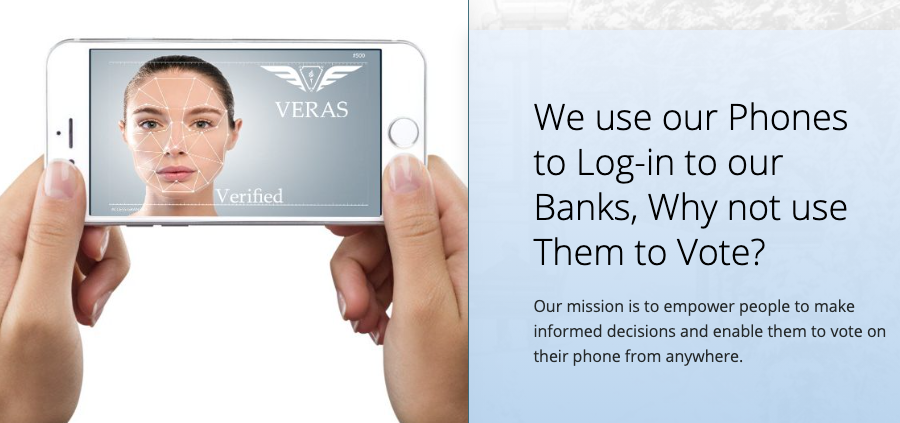A team of students from the University of Lethbridge are reportedly building a blockchain protocol to potentially revolutionize the way people vote and interact with their government in Canada. The virtual voting platform will strive to increase voter turnout and accessibility, and bring the “online banking” experience to political voicing.
Virtual Voting
Veras, a startup out of Canada, plans to build a blockchain protocol that could change the way that Canadians vote and engage in political voicing. A team of students from the University of Lethbridge are reportedly building a virtual voting platform called the “Blockchain Smart Voting System.”
The group of students have experienced significant momentum since the idea originated in May of 2019. After testing the concept at the “150 StartUps’ Innovation Rodeo” pitch competition, Veras was awarded $10,000 due to winning the events championship. Additionally, Veras earned a ticket to participate in a 5 week accelerator at Draper University ( Silicon Valley ) in June 2021.
How The Idea Surfaced
According to the report by Global News, the idea to tackle blockchain based virtual voting was all based on a general conversation between roommates in which they discussed the inefficiencies around paper based voting. The company stated that:
“I was in this blockchain hackathon at the time back in the spring of 2019, and I was hanging out with my roommate, Divine [Okonkwo], who is now our freelance graphic designer, and we were talking about elections and he’s like, ‘I don’t really trust elections where I come from in Africa. They use flimsy pieces of paper. I don’t trust it at all. To which I said, ‘They do the same thing here in Canada but with fancier pieces of paper,’” said Peter Hurd-Watler, the CEO of Veras Technologies INC.”
The Platform
According to the companies website, the students at UL verified the underlying issues by reaching out to MLA’s, Councillors, Mayors, and Constituents in Canada. During these conversations, it was verified that voter turnout and accessibility are problems that distress political voicing.

Similar to the evolution of digital banking, Veras envisions a future where people could vote from their couch. Banking developed into a digital experience, why cant voting? This is extremely different than the current environment where certain provinces in Canada only have 7% voter turnout for people between the age of 18-27. Other fundamental issues include long commutes to voting stations, and unbearable voting conditions for disabled individuals. Global pandemics like COVID-19 are also important, as they can ultimately result in reduced voter turnout. With Veras focusing on a virtual voting system, it can abolish many of the core issues, and revolutionize government interaction if it is mass adopted.
By leveraging blockchain applications, the smart voting system creates blockchain identity profiles that helps people cast their vote from pretty much anywhere. With blockchain infrastructure being immutable and secure, it adds a layer of transparency that the world has never witnessed. In an environment where people are arguing about the security behind mail-in ballots, casting a vote on the blockchain is in a whole different league.
Software engineer at Veras, Ismail Lawal, commented on blockchain security, stating that:
“It’s actually distributed in different servers, so if one hacker changes anything, it will signal other servers to say something has changed. This actually enhances security.”
Future Plans
It will be interesting to see how this project progresses. Despite this being a lucrative opportunity for Veras, it will entail a lot of obstacles to be adopted and accepted at the government level. With the legacy voting system being extremely outdated and inefficient on many levels, there is no doubt that blockchain infrastructure can fundamentally change how people vote in the future. In the United States for example, macro events like COVID-19 have caused chaos for the upcoming elections, mainly for people that do not feel comfortable voting in person. A virtual voting system would ensure transparency and efficiency in future elections.
In terms of Veras, the company plans to pilot their virtual voting system with a municipality in Alberta this year, with the goal of increasing voter turnout.
Notice: Information contained herein is not and should not be construed as an offer, solicitation, or recommendation to buy or sell securities. The information has been obtained from sources we believe to be reliable; however no guarantee is made or implied with respect to its accuracy, timeliness, or completeness. Authors may own the crypto currency they discuss. The information and content are subject to change without notice. Visionary Financial and its affiliates do not provide investment, tax, legal or accounting advice. This material has been prepared for informational purposes only and is the opinion of the author, and is not intended to provide, and should not be relied on for, investment, tax, legal, accounting advice. You should consult your own investment, tax, legal and accounting advisors before engaging in any transaction. All content published by Visionary Financial is not an endorsement whatsoever. Visionary Financial was not compensated to submit this article Please also visit our Privacy policy; disclaimer; and terms and conditions page for further information.

